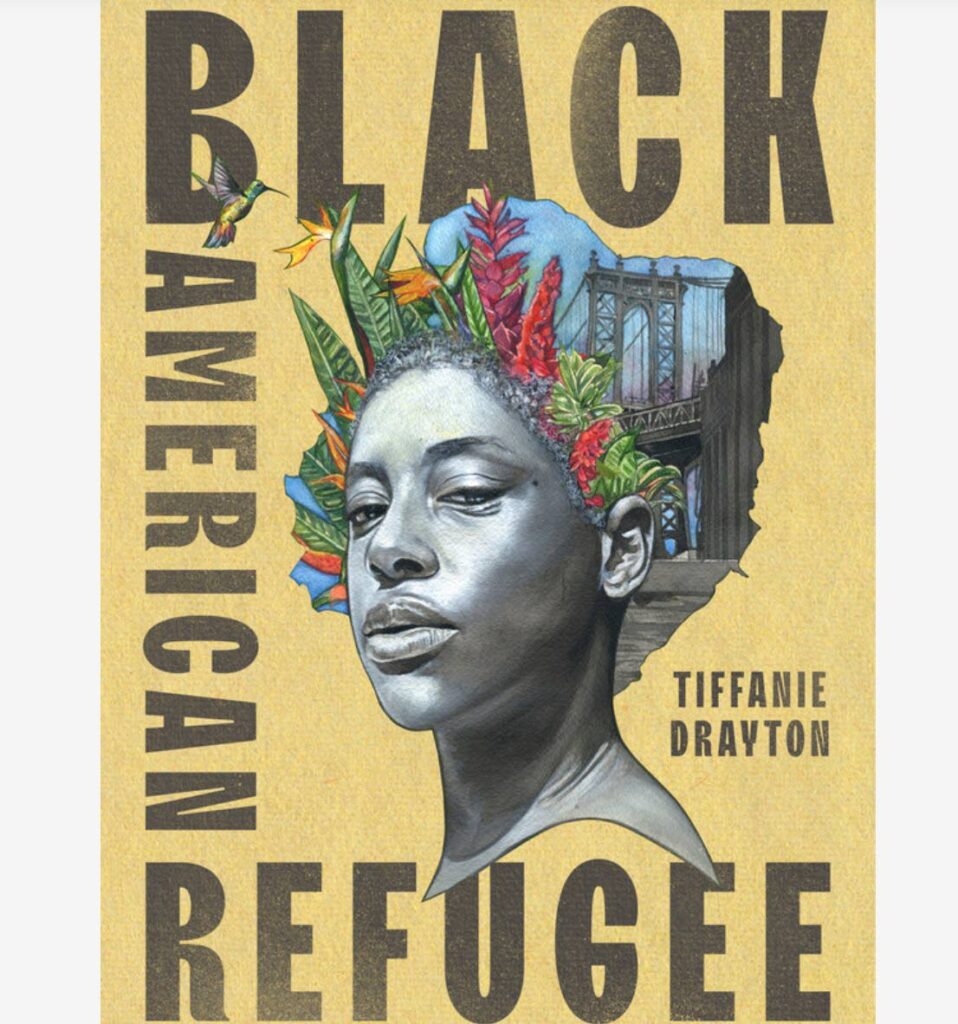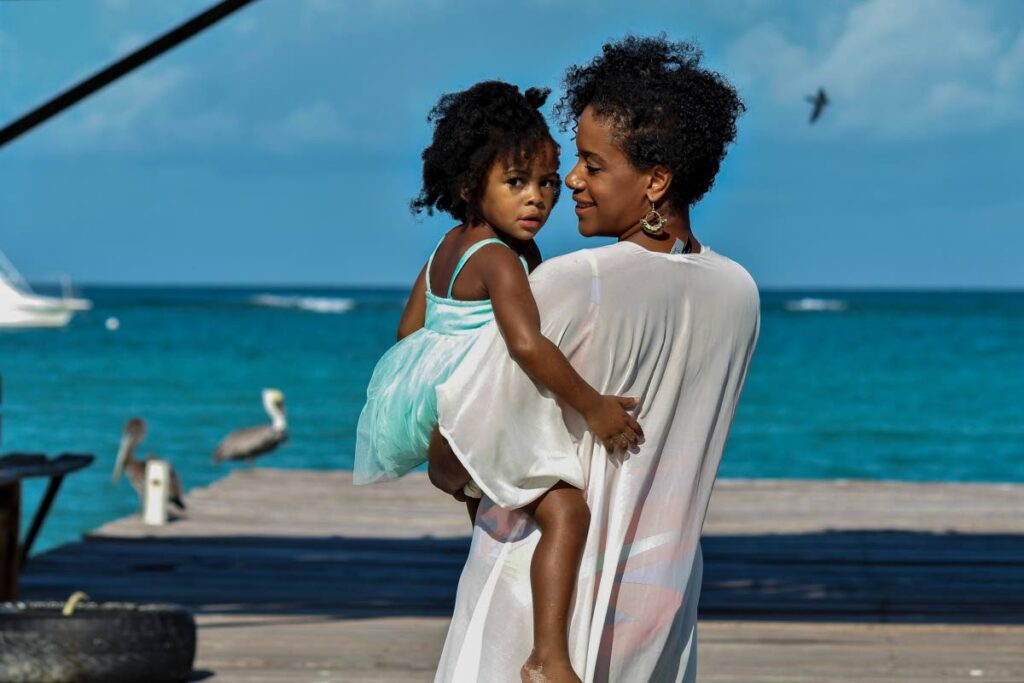Author Tiffanie Drayton escapes the 'American dream'

Tiffanie Drayton was four years old when her mother took her and her two siblings from their Santa Cruz home to live in the US, with the hope of giving them a better life.
Over two decades later, tired of chasing the “myth” that is the American dream, Drayton returned to TT, fleeing the systematic racism she encountered in the US.
The details of her experiences are documented in her recently published book, Black American Refugee: Escaping the Narcissism of the American Dream.
“The book pretty much tells the story of me moving to the US with my mom, sister and brother. She was a single parent. It tells about all that we had to do to constantly fight just to gain access to good housing and a proper education,” Drayton told WMN in a Zoom interview.

The book is an expansion of an essay she had written after George Floyd was murdered in 2020, sparking the Black Lives Matter movement. The essay was titled I’m a Black American. I Had to Get Out, and was published in the Opinion section of the New York Times.
“Black American Refugee really just details the experiences I had as a young black girl and a black woman in the US – experiences that really illuminate what the hold of systemic racism is like on an average black family. And it also secondarily looks at the theme of narcissistic abuse running throughout.”
Drayton, a journalist by profession, returned to TT in 2013 with her sister and her seven-year-old nephew.
“At the time my sister found a little private school in Tobago that she liked, and it was affordable. We decided to move there so he could have access to that school.”
But she hadn’t yet severed all ties with the US, and moved back and forth between her two homes. She had two children with her then partner, whom she describes as an “abusive narcissist,” and said for years she was trapped in an abusive cycle with him. She was eventually able to get out of it with the intervention of family, friends and therapy.
In 2019, she packed her things, took her children and settled in Tobago.
Once the blinkers were off, she was able to see the many abusive similarities between her relationships with her ex and with the US.

Drayton said sometimes explaining systematic racism can be problematic because some people view it through the lens of prejudice.
“But it is bigger than prejudice. When you’re dealing with systemic racism, there are policies in place, there are specific ways of governing society to make it so that you cannot have a good, decent life.”
She said one of the things that really had an impact on her family was policy on accessing affordable housing.
“In America there are so many policies that make it difficult for black people to have access to good, affordable housing, especially when it comes to home ownership.”
She cited “redlining” as one such example. Redlining is an illegal discriminatory practice in which a bank denies people mortgage loans, or an insurance provider restricts services to certain areas of a community, often to safeguard white families against having black families move into their neighbourhoods.
“That is one of the egregious examples of systemic racism that has had profound repercussions for people of colour and black people.”
Another, she said, is in the zoning laws governing the school system, which usually tie in with redlining.
“Your children cannot go to specific schools if they don’t live in specific neighbourhoods. So if you’re not allowed to have access to a good neighbourhood through mortgages and the banking system, then how are you going to have access to good schools for your kids?

"So it’s like a whole system that makes it difficult for black people to get ahead and move ahead.”
Drayton said because of this, she and her family moved around quite a bit in search of affordable housing and good schools. She has lived in New Jersey, Texas and Florida.
“I also lived in Hawaii for a while, then went to school in New York City,” at the New School University.
She began writing Black American Refugee in July 2020 and three months later she had the manuscript in hand.
For her, that was the easy part. The process of editing, artwork for the cover, and having the manuscript bouncing around between different people in the industry before going to print, all during a pandemic, was quite an experience.
“Oh man, you learn a lot about industries. The publishing industry is a very large industry, very white-dominated…So it was a fight for proper representation on one hand.
"But also it was like a really phenomenal experience with truly talented people who really know how to execute projects in a way that was awe inspiring. My editor, she has to be like a genius or something. The way that she works, this woman is so talented.”

She said that all of this happened in the midst of the pandemic meant that a lot of adjustments had to me made, causing her to see “the constant labouring” of the American culture in action and being able to appreciate that aspect of it.
“I finally got to see how that can translate into something beautiful.”
Drayton said since the launch of her book in February, she has had a lot of great feedback, and has been featured in publications like Marie Claire, Teen Vogue, USA Today and People magazine, among others.
“It’s been great to get that kind of feedback, because it’s hard as a writer, especially as a debut author for a book of this type, and as a woman of colour. I’m grateful I’ve been able to do what I’ve been able to do.”
The controversial content of the book even earned her a spot on the Daily Show with Trevor Noah.
“Yeah, that was awesome. I knew it (the book) would have blown up, because it will always be relevant. As long as America is standing, America will be racist and the book will forever be relevant, that’s just sad to say.”
Drayton, 32, has published two other non-fiction books for young adults that are used in schools – Developing Political Leadership Skills and Coping with Gun Violence.
“Black American Refugee is my first of this type. I knew it would pack a punch, because it’s only recently that America became open to having a conversation about racism, and that’s because they were forced to when everyone witnessed George Floyd being murdered by a police officer.”
At that point, she said, she believed people would begin to listen to what she had been writing about for years.
“What had happened was just so outrageous that they could no longer pretend and gasp and say, ‘Oh no, there is no such thing as racism.’ It was so evident by that point that the country had to at least pretend to be more open to dialogue.”
But, Drayton said, the book is not just about getting the US to talk about systematic racism. It is also a call to action and an argument for reparations. She said the narcissistic abuse by the system and its treatment of black people and women is so evident and prevalent, it’s leeching out into society.
“Look at what is happening with Kim (Kardashian) and Kanye (West).”
The couple is now divorced, with Kardashian complaining that West is belligerently harassing her.
“Angelina Jolie was recently speaking on a panel lauding the passage of the Violence against Women Act, which will increase protection for women who are leaving abusive relationships, because sadly, it’s when you try to leave your abuser that they will be most vicious and most horrendous, which is something I have had to learn.”

Drayton is currently in the US, locked in a custody battle for her children. She said she took her children when she walked out of the abusive relationship, but their father was able to manipulate the court system in the US and TT and took them back. Now, she is being forced to learn about another one of the US’s abusive tendencies – sexism.
“I’m witnessing the court system’s failure to protect women and children, and it’s just so broken. If it were up to me I’d be done, because I’m so tired of being here (in the US). I’m just ready to come home (to TT)…These are all the lessons of the moment for me and it’s sad…It can take years.”
But even as she is working to get her children back home to Tobago, where they will not be viewed as inferior because of the colour of their skin, Drayton said she is already trying to sell her next book – a critique of capitalism and its failure. Also, she said, there are a number of issues she sees plaguing this era that will require significant action, mobilisation and unity.
“I really want to get into advocacy, particularly around energy and sustainability of food and all of the tough things we have to face as a global collective, including in TT. I feel the urgent need to make people aware that every single issue they think will have an impact on us in 100 years is beginning to have an impact now.
"The climate crisis, the possibility of being on the brink of nuclear war – there is just so much happening that requires people to be extremely informed and uniformed. That is my next project, getting people informed and mobilised on these critical issues.”

Comments
"Author Tiffanie Drayton escapes the ‘American dream’"